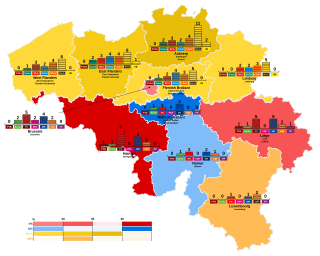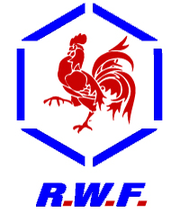
Walloons are a Gallo-Romance ethnic group native to Wallonia and the immediate adjacent regions of Flanders, France, Germany, Luxembourg and the Netherlands. Walloons primarily speak langues d'oïl such as Belgian French, Picard and Walloon. Walloons are primarily Roman Catholic, with a historical minority of Protestantism which dates back to the Reformation era.

The politics of Belgium take place in the framework of a federal, representative democratic, constitutional monarchy. The King of the Belgians is the head of state, and the prime minister of Belgium is the head of government, in a multi-party system. Executive power is exercised by the government. Federal legislative power is vested in both the government and the two chambers of parliament, the Senate and the Chamber of Representatives. The federation is made up of (language-based) communities and (territorial) regions. Philippe is the seventh and current King of the Belgians, having ascended the throne on 21 July 2013.

Wallonia, officially the Walloon Region, is one of the three regions of Belgium—along with Flanders and Brussels. Covering the southern portion of the country, Wallonia is primarily French-speaking. It accounts for 55% of Belgium's territory, but only a third of its population. The Walloon Region and the French Community of Belgium, which is the political entity responsible for matters related mainly to culture and education, are independent concepts, because the French Community of Belgium encompasses both Wallonia and the bilingual Brussels-Capital Region but not the German-speaking Community of Belgium.

The Reformist Movement is a liberal French-speaking political party in Belgium. which includes social-liberal and conservative-liberal factions. The MR is one of the oldest party on the European continent.

Elio Di Rupo is a Belgian politician who has served as the minister-president of Wallonia since 2019. He is affiliated with the Socialist Party. Di Rupo previously served as the prime minister of Belgium from 6 December 2011 to 11 October 2014, heading the Di Rupo Government. He was the first francophone to hold the office since Paul Vanden Boeynants in 1979, and the country's first socialist prime minister since Edmond Leburton left office in 1974. Di Rupo was also Belgium's first prime minister of non-Belgian descent, and the world's second openly gay person and first openly gay man to be head of government in modern times.

The Flemish Movement is an umbrella term which encompasses various political groups in the Belgian region of Flanders and, less commonly, in French Flanders. Ideologically, it encompasses groups which have sought to promote Flemish culture and the Dutch language as well as those seeking greater political autonomy for Flanders within Belgium. It also encompasses nationalists who seek the secession of Flanders from Belgium, either through outright independence or unification with the Netherlands.

The Parliament of Wallonia is the legislative body of Wallonia, one of the three self-governing regions of Belgium. The parliament building, the former Hospice Saint-Gilles, is situated in Namur, the capital of Wallonia, at the symbolic confluence of the Meuse and the Sambre, the two main rivers of the most inhabited parts of Wallonia, the Sillon industriel. On the other side of the Meuse, facing the Parliament, is the Élysette, the seat of the Government of Wallonia.

In Belgium, the French Community refers to one of the three constituent constitutional linguistic communities. Since 2011, the French Community has used the name Wallonia-Brussels Federation, which is controversial because its name in the Belgian constitution has not changed and because it is seen as a political statement. The name "French Community" refers to Francophone Belgians, and not to French people residing in Belgium. As such, the French Community of Belgium is sometimes rendered in English as "the French-speaking Community of Belgium" for clarity, in analogy to the German-speaking Community of Belgium.

The Socialist Party is a social democratic French-speaking political party in Belgium. As of the 2024 elections, it is the fourth largest party in the Belgian Chamber of Representatives and the largest Francophone party. The party is led by Paul Magnette. The party supplies the Minister-president of the French Community, and the Brussels-Capital Region. In the German-speaking community, the party is known as the Sozialistische Partei (SP).

The Workers' Party of Belgium is a Marxist and socialist political party in Belgium. It is the only Belgian party represented in parliament that is a fully national party, representing both Flanders and Wallonia. Having historically been a small party, the PTB-PVDA has gained momentum since the 2010s, continuously scoring better at the elections, particularly in Wallonia and working-class communities in Brussels.
The politics of Wallonia concern the government of Wallonia, that is the southern Region of Belgium.

Paul Magnette is a Belgian politician. Since 2019, he is the leader of the Socialist Party, a social democratic French-speaking party in Belgium. Since 2012, he is also mayor of Charleroi. Magnette is a former political science professor at the Free University of Brussels (ULB) and Director of the Institute of European Studies of the ULB. He was appointed minister in the Belgian federal government from 2007 to 2013 and was Minister-President of Wallonia from 2014 to 2017. He also was a member of the Senate of Belgium, of the Parliament of Wallonia and of the Parliament of the French Community.

Wallonie libre is a minor political party active in Wallonia in Belgium which originated as a group active within the resistance in German-occupied Belgium during World War II. Affiliated with the Walloon Movement, its ideology became increasingly radical in the post-war period.
The Walloon Rally is a regionalist political party in Belgium, active in Wallonia since 1968. The party favoured federalism and since 1985 independence.
The Walloon Movement is an umbrella term for all Belgium political movements that either assert the existence of a Walloon identity and of Wallonia and/or defend French culture and language within Belgium, either within the framework of the 1830 Deal or either defending the linguistic rights of French-speakers. The movement began as a defence of the primacy of French but later gained political and socio-economic objectives. In French, the terms wallingantisme and wallingants are also used to describe, sometimes pejoratively, the movement and its activists. To a lesser extent, the Walloon Movement is also associated with the representation of the small German-speaking population in the East Belgium of the Walloon Region.
The partition of Belgium is a hypothetical situation, which has been discussed by both Belgian and international media, envisioning a split of Belgium along linguistic divisions, with the Flemish Community (Flanders) and the French-speaking Community (Wallonia) becoming independent states. Alternatively, it is hypothesized that Flanders could join the Netherlands and Wallonia could join France or Luxembourg.

Rattachism or Reunionism is a political ideology which calls for the French-speaking part of Belgium or Wallonia to secede from Belgium and become part of France. Brussels, which is majority French-speaking but enclaved in Flanders, may be included within this ideology; as may the six Flemish municipalities with language facilities for French-speakers around Brussels. It can be considered a French-speaking equivalent of Grootneerlandisme in Flanders.

Federal elections were held in Belgium on 25 May 2014. All 150 members of the Chamber of Representatives were elected, whereas the Senate was no longer directly elected following the 2011–2012 state reform. These were the first elections held under King Philippe's reign.
Paul-Henry Gendebien was a Belgian economist and politician of the Walloon Rally (RW) and the Rassemblement Wallonie France (RWF). He was descended from Alexandre Gendebien, who was Belgium's first Minister of Justice.
















